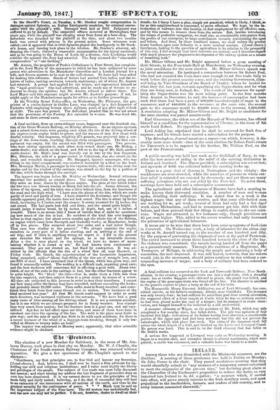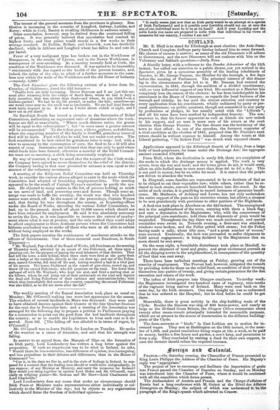IRELAND.
Among those who are dissatisfied with the Ministerial measures, are the distillers. A meeting of those gentlemen was held in Dublin on Monday; Sir John Power in the chair. They passed resolutions avowing that they would cheerfully submit to "any measure of a temporary nature calculated to meet the exigencies of the present time," but declaring great alarm at the Chancellor of the Exchequer's proposition to reduce the duties on rum imported into Ireland to 3s. 2d. a gallon; "a measure which, if carried into effect, will prove utterly ruinous to the Irish distillery trade, and most prejudicial to the landholders, farmers, and traders of this country, and to every interest connected therewith."
The tenour of the general accounts from the provinces is gloomy. Des- titution is increasing in the counties of Longford, Galway, Leitrim, and Kerry; while in Cork, Bantry is rivalling Skibbereen in extreme misery. Some consolation, however, may be derived from the continued falling of prices. It was generally believed that speculation had reached its highest limits, and that prices would recede in a few weeks to their average standard. At Dublin, Belfast, and Limerick, corn has decidedly declined; while in Athlone and Longford wheat has fallen 5s. and oats 2s. per barreL Fever of a very malignant type has broken out in the Workhouse of Dungannon, in the county of Tyrone, and in the Newry Workhouse, in consequence of over-crowding. At a meeting recently held at Cork, the condition of the Workhouse was discussed. It was agreed to be impossible, " consistently with due regard to the health of the present inmates, and, indeed, the safety of the city, to admit of a further accession to the num- bers now within the walls of the Workhouse and the old House of Industry —namely, 5,300."
The Cork Examiner gives the following extract of a letter from Dr. Crowley, of Skibbereen, dated the 22d instant-
" Deaths here are daily increasing. Doctor Donovan and I are just this mo- ment after returning from the village of South Reen, where we had to bury a body ourselves, that was eleven days dead—and where, do you think?—in a kitchen-garden! We had to dig the ground, or rather the hole, ourselves—no one would come near us, the smell was so intolerable. We are half dead from the work lately imposed on us. It is now as I write eleven o'clock at night, and I have not as yet dined."
Sir Randolph Routh has issued a circular to the Secretaries of Relief Committees, authorizing an augmented ratio of donations where the work- houses are full or unavailable. " Where much distress exists, the grants will be equal to the subscriptions "; but "in some cases a greater amount will be recommended." To the infirm poor, widowsarphans, and children, where the supporting member of the family is disabffid, gratuitous issues of food will be made. Food will also be sold, but not under cost price. The food considered to be best suited for gratuitous issue is soup: and, with a view to economy in the consumption of corn, the food to be sold will also consist of soup. Secretaries are informed that they can only be paid where relief-funds have been formed; otherwise a member of the Relief Commit- tee must act as secretary, a clerk being occasionally employed.
By way of contrast, it may be noted that the tenants of the Cloth-work- ers Company have agreed to assess themselves for the relief of the district; the Company having in that case promised to advance a sum equal to the amount of the voluntary assessment.
A meeting of the Kildysart Relief Committee was held on Thursday week, to consider the various abuses alleged to exist in the mode which the Committee had adopted of furnishing employment-lists. The meeting appeared to be the result of Captain Wynne's exertions to purify the sys- tem. He objected to many names in the list, of persons holding as much as ten acres of land, and possessing cows and horses. Though some at- tempt was made to baffie the scrutiny, the result was that two hundred names were struck off. In the course of the proceedings, Captain Wynne mid, that during his tour throughout tbd county, as Inspecting-officer ander the Board of Works, attending the various Relief Committees, he had, up to the present, struck off about 18,000 names which should not have been returned for employment. He said it was absolutely necessary to revise the lists, as it was impossible to increase the extent of employ- ment above what it was at present; and the only method they could adopt to afford employment to those destitute persons whom the Committees had hitherto overlooked was to strike off those who were at all able to subsist without being employed on the works.
The Irish papers mention the continuance of murderous attacks on the officers of Government. One of these occurred near Dundrum, in South Tipperary-
" Mr. Weyland, Pay-clerk of the Board of Works, left Dandram on the morning of Thursday week, attended by an escort of two Policemen, all three upon a jaunting-car, for the purpeee of paying the road-labourers of that district. They had left the town a mile behind, when three shots were fired at the party from over a hedge at the roadside, directly as the car drew up; and one of the Police- men, named Crowley, fell dead off his seat, having received a ball in a vital part of his person. The horse, frightened at the report of gun-shots, reared up, and threw off the second Policeman; who fell prostrate on the road. The horse then galloped off with Mr. Weyland; who kept his seat, and fired a parting shot at six fellows, whom he saw jump out of their ambuscade on the road and deprive the dead and living Policemen of their carbines and ammunition-belts; with which they immediately fled across the country, conceiving the second Policeman was also killed, as he did not move after the fall."
The weekly meeting of the Repeal Association took place as usual on Monday; Mr. O'Connell making one more last appearance for the season. The conduct of several landlords in Mayo was discussed: they were said to have obtained decrees against their tenants at the late Quarter-Sessions for the rent due in November last; and a meeting of the Association was arranged for the following day to prepare a petition to Parliament praying for a commission to point out the good from the bad landlords throughout the country, so as to enable the Legislature to treat each case as it de- served. Rent 161. [The falling off was alluded to in terms of regret, by O'Connell.] Mr. O'Connell was to leave Dublin for London on Tuesday. He spoke of the weather as a cause of detention, and said that his strength was failing.
In answer to an appeal from the Marquis of Sligo on the formation of an Irish party, Lord Londonderry has written a long letter against the proposition. If such an experiment was to be tried in Ireland, he asks, " Would there be less contention, less difference of opinion, less haranguing, and less prejudices in their debates and differences, than in the House of Commons? "— "Can it in the days we live in, and in the state of feelings in Ireland, be sup- posed for a moment that the leading men should or could unite independently, as you suppose, of any Minister or Ministry, and carry the measures for Ireland ? How would you bring together in opinion Lord Roden and Mr. O'Connell, espe- cially on religious points—Mr. Grattan and Mr. Shaw—Lord Charlemont and Lord Charleville."
Lord Londonderry does not mean that under no circumstance should Irish Peers or Members make representations either individually or col- lectively to the Minister of the day; but he objects to any organization which should fetter the freedom of individual opinion-
" It really seems just now that an Irish party would be an attempt at a species of Irish Parliament ;1 and is it possible your Lordship should not see at once the aim of one individual must be to be at its head? And if your Lordship and the noble Lords you name are prepared to unite with that individual in his views of measures for our country, I confess I am not."



































 Previous page
Previous page